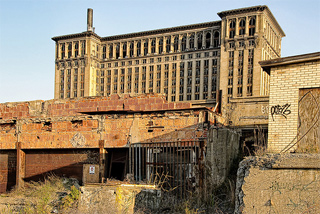Columnist Wants to See More Detroit In Chicago: Casinos and Urban Farms for all
By JoshMogerman in Miscellaneous on Oct 17, 2010 7:00PM
We are Mary Mitchell fans. She writes things that need to be said in this town and is willing to speak truth to power.
And, ever since reading the Reader’s travel piece on Detroit last year, we’ve been pretty fascinated by what is going on in the Motor City.
So we should have loved Mary Mitchell’s column in the Sun-Times yesterday about how Chicago could learn a thing or two from the “arsenal of democracy,” right? Wrong. It was pretty far off base, highlighting casinos and urban farming as an insane prescription for urban renewal in the Rust Belt (though we certainly agree on the deficit cutting stuff). Detroit is a unique case. Not to fall into the sad media caricature of a city wrecked by the collapse of the auto industry; but one of America’s great cities is now littered with actual ruins and packs of wild dogs (literally). If for nothing else than sheer scale, the situation in Hockey Town is different from places like Youngstown, Gary, and our own South Side where similar forces are at work. Mitchell’s column is well meaning; but it is apples and oranges.
Mitchell notes that Detroit collects over $170 million in tax revenue from its three casinos, but ignores the arguments that have dogged similar discussions for a land-based casino inside Chicago’s city limits. Many feel that casinos, especially ones located in poor communities, are perhaps the most regressive form of taxation possible, preying upon the aspirations of folks who can least afford to gamble on their future. The tax arguments did not work for Daley at the height of his power, so they are not likely to work here now.
Detroit is so vast that you could dump Manhattan, Seattle, and San Francisco within its borders with room to spare. But as the city’s population has shrunk, vast tracts of emptiness have begun to dominate the landscape; in fact there are large sections of town that are being reclaimed by prairie. Using some of that space to grow food makes sense -- but is that revitalization? There are a number of groups doing urban farming on a smaller scale in Chicago already, and we hope they will expand, but these are short-term improvements that don’t look like the sort of keys to rebirth that Mitchell advertises to us.
What is more exciting in Detroit is the creative energy. Arts colonies. Bicycle culture. An amazing music scene. These are the things that bring people back into the urban core (not to mention Detroit’s super-cheap real estate prices) and revitalize a tax base. It seems like we should find ways to encourage the exciting creative activity in Detroit to help it recover rather than turning it into a farm surrounded by a town, paid for by casinos.
But don’t take our word for it -- let Johnny Knoxville drop his Detroit knowledge on you in the admittedly superficial documentary “Detroit Lives” which is packed with a lot of interesting Rock City images. See any lessons there that we should be applying to Chicago? We don't. But we continue to love the 3-1-3.
Palladium presents: Detroit Lives featuring Johnny Knoxville from Palladium on Vimeo.
